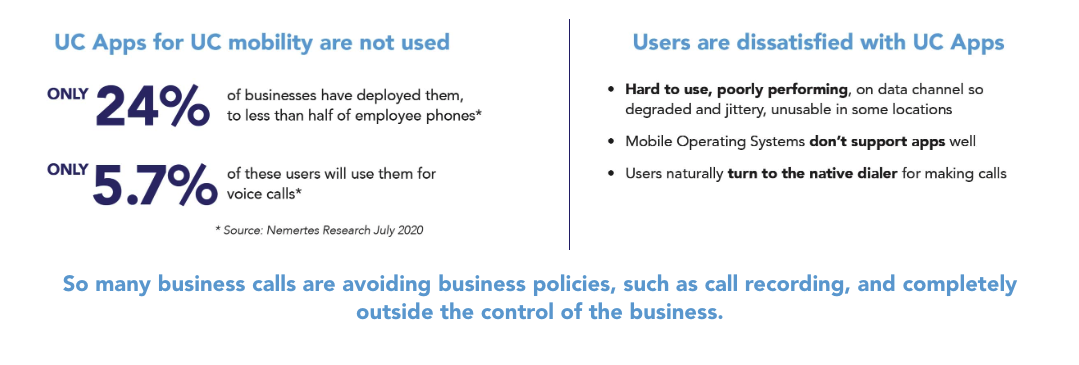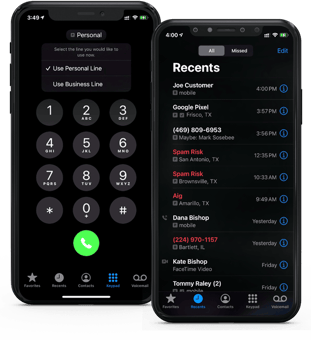June 5, 2023

You would be hard-pressed to find someone not carrying a personal cell phone these days. You’d be even harder-pressed to pry that phone out of their hand.
We love our mobiles, and we carefully choose our favorite device based on our own preferences for features and ease of use. We can whip them out on a dime to instantly access whatever it is we need, and doing so is always going to be our first instinct for communication
So regardless of whether an employer provides company-owned mobiles or has a Bring-Your-Own-Device (BYOD) program, many in the mobile workforce are already using their own phones for work, because they are familiar with them or don’t want to carry two devices around.
But now native mobile Unified Communications powered by Tango Extend can bring us the best of both worlds: employees can use their own mobile phones and employers can control the business communications on them.
The BYOD Choice
A study has found that 87% of respondents said choosing their work device is important.
As employers deal with the ever-increasing work-from-anywhere trend and as more Gen Y and Z workers enter the workforce, allowing employees and contractors to use their own phones certainly provides cost-saving benefits, but there are also legitimate concerns on both ends of the line.
BYOD devices, whether laptops or mobile phones, need to be managed by the company when used for business. If an unmanaged mobile device is used to make business calls by, say a regulated user in the financial services sector, then not only will the call recipient see a personal number, but the caller could be in breach of compliance rules, where such calls need to be recorded. Failure of those measures has led to significant fines in the financial industry.
The alternative of carrying a second, possibly unfamiliar company-provided phone isn’t an attractive option and is a very expensive one for employers. Our research finds that it costs about $900 per year per employee in hardware and service charges to supply mobile phones to employees.
The Issues with UC Apps for Voice Calls
Some UC vendors have tried to address the BYOD use case by providing an app which can simulate a business line on the device. These are often laptop clients, adjusted for mobile, and are not optimized for the environment they are used in. They consume large amounts of battery power when active and users do not naturally want to open an app to make a voice call. They gravitate to using the native dialer.
In fact, less than 7% of people provided with a UC app actually use it for voice calls. So that leaves the majority of mobile business calls using personal numbers and not the assigned business identities.
Why? Because their own phone is familiar, and they just prefer using it. The apps also have spotty call quality because they use VoIP over the mobile data channel, not the higher-quality native voice network. The poor quality is not acceptable to many employees who need reliability when making important business calls. It’s also a concern for employers that when employees leave the business, their business contacts go with their mobile.

Tango Extend: the BYOD Win-Win
Tango Networks has found the solution to these BYOD issues by effectively adding a secure and company-controlled business line to a personal cell phone, making it two phones in one, and keeping the two personas completely separate.
 Tango Extend is the communications industry’s first service using a modern eSIM to instantly add a business-controlled extension to a mobile phone, with all the features of the UC platform included. It delivers the office extension experience to hybrid workers. It’s the desk phone in your pocket, and you don’t have to carry two devices, as the eSIM can be downloaded in minutes to the spare SIM slot in almost any modern mobile device. Once there, it is completely separate from the existing personal SIM card and all usage for business is paid for by the employer.
Tango Extend is the communications industry’s first service using a modern eSIM to instantly add a business-controlled extension to a mobile phone, with all the features of the UC platform included. It delivers the office extension experience to hybrid workers. It’s the desk phone in your pocket, and you don’t have to carry two devices, as the eSIM can be downloaded in minutes to the spare SIM slot in almost any modern mobile device. Once there, it is completely separate from the existing personal SIM card and all usage for business is paid for by the employer.
Employees can use their own mobile phones for business communications with a business identity, while their personal communications remain separate and private. Companies have full control over the business communications and can even capture and record them for archiving and compliance purposes, and to avoid those hefty fines.
It’s a win-win. Employees can use the devices they know and love, get the best quality business calls and their employers can retain control over mobile UC with all the benefits of company-owned phones, but without the expense.
Featuring the most advanced implementation of fixed mobile convergence technologies, Tango Extend supports many use cases for a distributed workforce, including Mobile Unified Communications, mobile workforce communications, and programs for remote working, work from home, telecommuting and business continuity.
Get in touch today to learn how Tango Extend will make BYOD truly business ready for your company.
